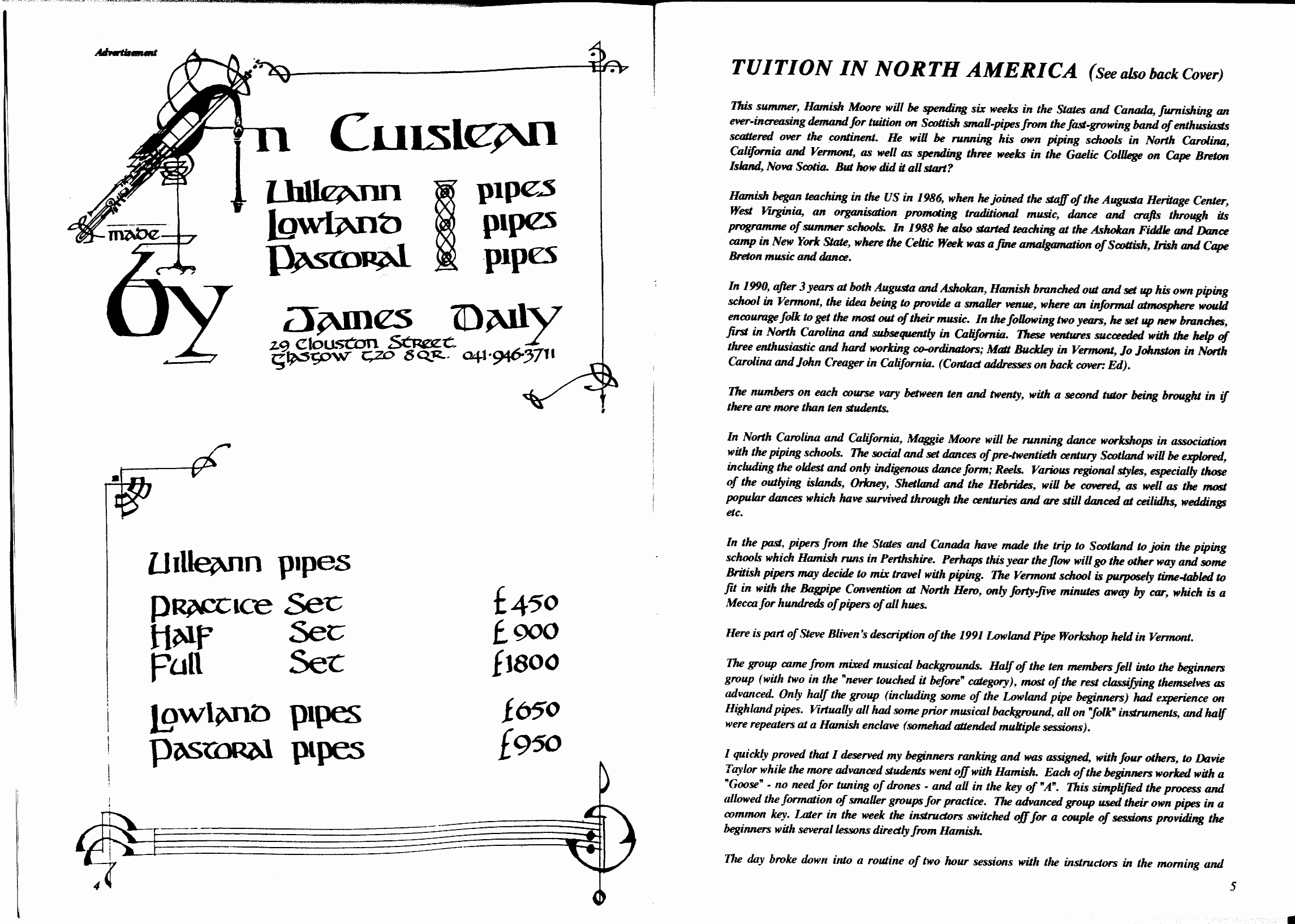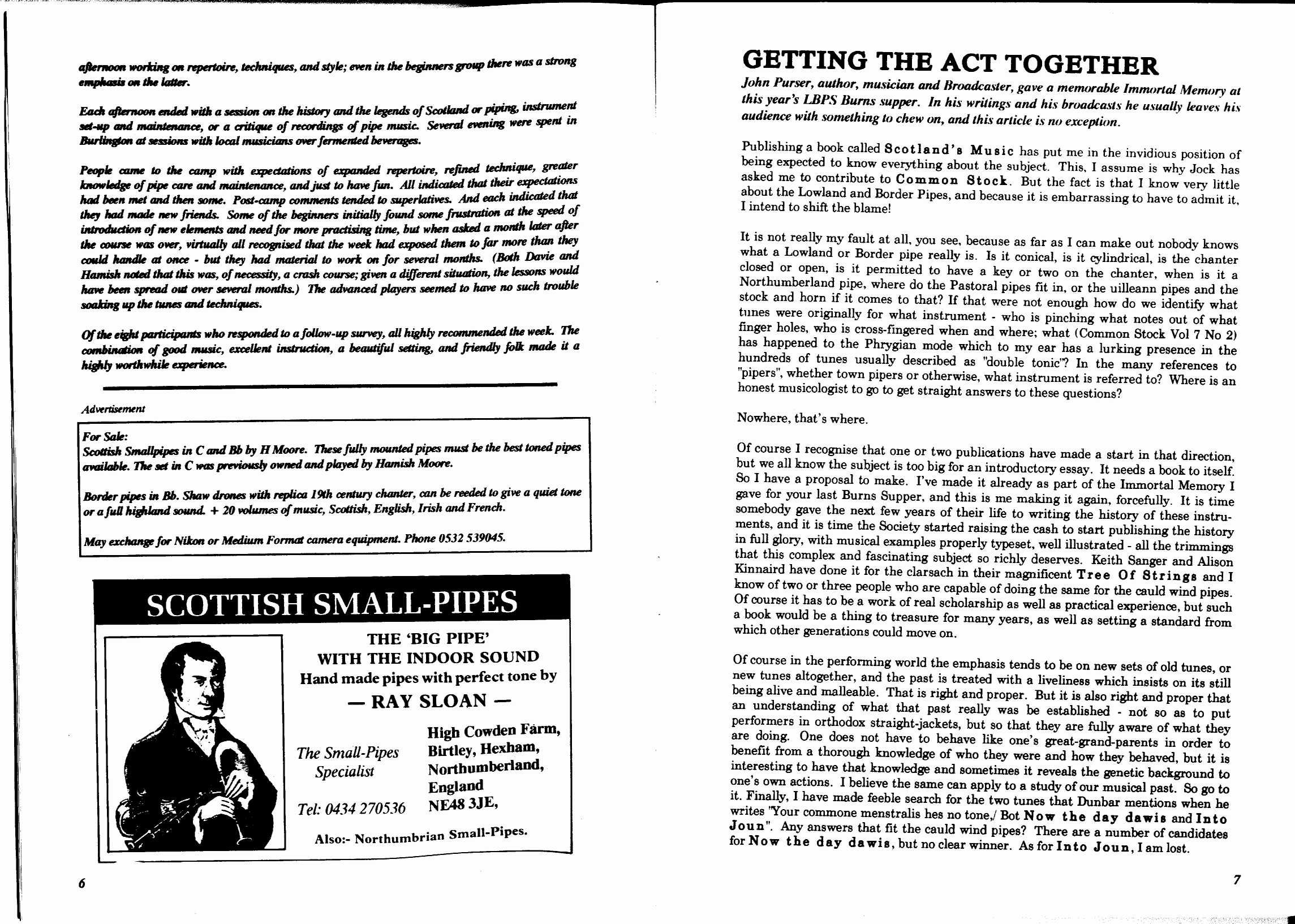Tuition In North America


This summer, Hamish Moore will be spending six weeks in the States and Canada, furnishing an ever-increasing demand for tuition on Scottish small-pipes from the fast-growing band of enthusiasts scattered over the continent. He will be running his own piping schools in North Carolina, California and Vermont, as well as spending three weeks in the Gaelic Colllege on Cape Breton Island, Nova Scotia. But how did it all start?
Hamish began teaching in the US in 1986, when he joined the staff of the Augusta Heritage Center, West Virginia, an organisation promoting traditional music, dance and crafts through its programme of summer schools. In 1988 he also started teaching at the Ashokan Fiddle and Dance camp in New York State, where the Celtic Week was a fine amalgamation of Scottish, Irish and Cape Breton music and dance.
In 1990, after 3 years at both Augusta and Ashokan, Hamish branched out and set up his own piping school in Vermont, the idea being to provide a smaller venue, where an informal atmosphere would encourage folk to get the most out of their music. In the following two years, he set up new branches, first in North Carolina and subsequently in California. These ventures succeeded with the help of three enthusiastic and hard working co-ordinators; Matt Buckley in Vermont, Jo Johnston in North Carolina and John Creager in California. (Contact addresses on back cover: Ed).
The numbers on each course vary between ten and twenty, with a second tutor being brought in if there are more than ten students. In North Carolina and California, Maggie Moore will be running dance workshops in association with the piping schools. The social and set dances of pre-twentieth century Scotland will be explored, including the oldest and only indigenous dance form; Reels. Various regional styles, especially those of the outlying islands, Orkney, Shetland and the Hebrides, will be covered, as well as the most popular dances which have survived through the centuries and are still danced at ceilidhs, weddings etc.
In the past, pipers from the States and Canada have made the trip to Scotland to join the piping schools which Hamish runs in Perthshire. Perhaps this year the flow will go the other way and some British pipers may decide to mix travel with piping. The Vermont school is purposely time-tabled to fit in with the Bagpipe Convention at North Hero, only forty-five minutes away by car, which is a Mecca for hundreds of pipers of all hues.
Here is part of Steve Bliven’s description of the 1991 Lowland Pipe Workshop held in Vermont:
The group came from mixed musical backgrounds. Half of the ten members fell into the beginners group (with two in the "never touched it before" category), most of the rest classifying themselves as advanced. Only half the group (including some of the Lowland pipe beginners) had experience on Highland pipes. Virtually all had some prior musical background, all on "folk" instruments, and half were repeaters at a Hamish enclave (some had attended multiple sessions).
I quickly proved that I deserved my beginners ranking and was assigned, with four others, to Davie Taylor while the more advanced students went off with Hamish. Each of the beginners worked with a "Goose" - no need for tuning of drones - and all in the key of "A". This simplified the process and allowed the formation of smaller groups for practice. The advanced group used their own pipes in a common key. Later in the week the instructors switched off for a couple of sessions providing the beginners with several lessons directly from Hamish.
The day broke down into a routine of two hour sessions with the instructors in the morning and afternoon working on repertoire, techniques, and style; even in the beginners group there was a strong emphasis on the latter. Each afternoon ended with a session on the history and the legends of Scotland or piping, instrument set-up and maintenance, or a critique of recordings of pipe music. Several evening were spent in Burlington at sessions with local musicians over fermented beverages.
People came to the camp with expectations of expanded repertoire, refined technique, greater knowledge of pipe care and maintenance, and just to have fun. All indicated that their expectations had been met and then some. Post-camp comments tended to superlatives. And each indicated that they had made new friends. Some of the beginners initially found some frustration at the speed of introduction of new elements and need for more practising time, but when asked a month later after the course was over, virtually all recognised that the week had exposed them to far more than they could handle at once - but they had material to work on for several months. (Both Davie and Hamish noted that this was, of necessity, a crash course; given a different situation, the lessons would have been spread out over several months.) The advanced players seemed to have no such trouble soaking up the tunes and techniques.
Of the eight participants who responded to a follow-up survey, all highly recommended the week. The combination of good music, excellent instruction, a beautiful setting, and friendly folk made it a highly worthwhile experience.
